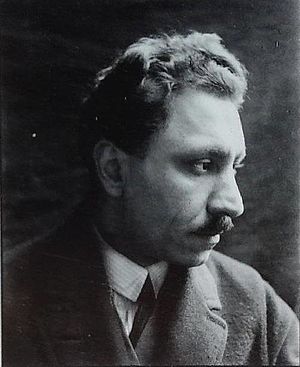Abdullah Khairan: Difference between revisions
No edit summary |
No edit summary |
||
| Line 8: | Line 8: | ||
| birth_place = al-Manarat, [[Amran|Amran Province]], [[Fahran|Kingdom of Fahran]] | | birth_place = al-Manarat, [[Amran|Amran Province]], [[Fahran|Kingdom of Fahran]] | ||
| death_date = {{death date and age|1954|12|19|1875|12|11|df=y}} | | death_date = {{death date and age|1954|12|19|1875|12|11|df=y}} | ||
| death_place = {{Nowrap|Sumeira, [[Khimyariyyah|Khimyariyyah Province]], [[Fahran| | | death_place = {{Nowrap|Sumeira, [[Khimyariyyah|Khimyariyyah Province]], [[Fahran|Republic of Fahran]]}} | ||
| alma_mater = [[University of Sumeira]] | | alma_mater = [[University of Sumeira]] | ||
| school_tradition = {{unbulleted list | | school_tradition = {{unbulleted list | ||
| Line 20: | Line 20: | ||
| {{wp|Philosophy of History}} | | {{wp|Philosophy of History}} | ||
| {{wp|Aesthetics}} | | {{wp|Aesthetics}} | ||
| {{wp|Ontology}} | |||
}} | |||
| influences = {{flatlist| | | influences = {{flatlist| | ||
People | People | ||
}} | }} | ||
| influenced = {{flatlist| | | influenced = {{flatlist| | ||
People | |||
}} | }} | ||
| notable_ideas = | | notable_ideas = {{flatlist| | ||
[[Aristocracy of the Epoch|Ashraf al-Takayuf]] | |||
[[Heroic History]]}} | |||
}} | }} | ||
'''Abdullah Rifat Khairan''' FFA (11 December 1875 – 19 December 1954), known popularly as '''Abdullah Khairan''', was a [[Fahran|Fahrani]] {{wp|philosopher}}, {{wp|teacher|educator}}, {{wp|Poetry|poet}}, {{wp|Literary criticism|literary critic}}, and {{wp|intellectual|man of letters}} notable for his sardonic wit and popular aphorisms, many of which are still cited today. Often considered among the nation's foremost conservative thinkers, alongside [[Bahjat al-Asiri]] and [[Dastgir Shah Haddad]], he was deeply influenced by !Hegelian philosophy and the Belisarian [[Illumination]]. Khairan was an ardent proponent of the underpinning virtues within the nation-state and of the importance of [[Azdarin]] in Gharib moral life, the latter despite his agnostic proclivities. While his impassioned, often feverish, support for the monarchy as an institution set him in stark contrast with the secular intelligentsia, who embraced republicanism and liberalism, Khairan is often referenced as a pioneer of the [[Safk Movement]]. | '''Abdullah Rifat Khairan''' FFA (11 December 1875 – 19 December 1954), known popularly as '''Abdullah Khairan''', was a [[Fahran|Fahrani]] {{wp|philosopher}}, {{wp|teacher|educator}}, {{wp|Poetry|poet}}, {{wp|Literary criticism|literary critic}}, and {{wp|intellectual|man of letters}} notable for his sardonic wit and popular aphorisms, many of which are still cited today. Often considered among the nation's foremost conservative thinkers, alongside [[Bahjat al-Asiri]] and [[Dastgir Shah Haddad]], he was deeply influenced by !Hegelian philosophy and the Belisarian [[Illumination]]. Khairan was an ardent proponent of the underpinning virtues within the nation-state and of the importance of [[Azdarin]] in Gharib moral life, the latter despite his agnostic proclivities. While his impassioned, often feverish, support for the monarchy as an institution set him in stark contrast with the secular intelligentsia, who embraced republicanism and liberalism, Khairan is often referenced as a pioneer of the [[Safk Movement]]. | ||
Revision as of 16:36, 21 August 2022
Abdullah Khairan | |
|---|---|
 | |
| Born | Abdullah Rifat Khairan 11 December 1875 al-Manarat, Amran Province, Kingdom of Fahran |
| Died | 19 December 1954 (aged 79) Sumeira, Khimyariyyah Province, Republic of Fahran |
| Alma mater | University of Sumeira |
| Era | Modern Era |
| Region | Ozerosi Philosophy |
| School | |
Main interests | |
Notable ideas | |
Influences
| |
Influenced
| |
Abdullah Rifat Khairan FFA (11 December 1875 – 19 December 1954), known popularly as Abdullah Khairan, was a Fahrani philosopher, educator, poet, literary critic, and man of letters notable for his sardonic wit and popular aphorisms, many of which are still cited today. Often considered among the nation's foremost conservative thinkers, alongside Bahjat al-Asiri and Dastgir Shah Haddad, he was deeply influenced by !Hegelian philosophy and the Belisarian Illumination. Khairan was an ardent proponent of the underpinning virtues within the nation-state and of the importance of Azdarin in Gharib moral life, the latter despite his agnostic proclivities. While his impassioned, often feverish, support for the monarchy as an institution set him in stark contrast with the secular intelligentsia, who embraced republicanism and liberalism, Khairan is often referenced as a pioneer of the Safk Movement.